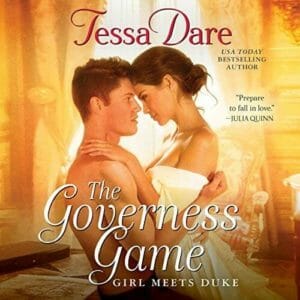If you’re a fan of historical romances, then you’ll know pretty much what you’re going to get from a novel by Tessa Dare. Something mostly frothy and fluffy (with maybe just a little bit of darkness), plenty of humour and flirty banter, and well-written naughtiness. What you won’t get is a great deal of originality when it comes to the plot, or historical accuracy when it comes to the situations or dialogue; there’s no real sense of being in the early nineteenth century other than, as happens here, a few references to people who lived at the time (in this case, a group of female astronomers and mathematicians – brava!). Anyone who knows me or reads my reviews regularly will know that I generally prefer historicals with a strong sense of period in which the characters operate (mostly) within the constraints of the time in which the novels are set; but I recognise that there are readers and listeners for whom that isn’t important and who just want to enjoy an engaging, well-written story.
The Governess Game (book two in the Girl Meets Duke series) runs true to form as described above. It’s an engaging piece of light-hearted froth featuring a rakish yet endearing hero, an unlikely governess and two precocious little girls who have been left to the hero’s guardianship after the death of their parents. Almost a year before the beginning of the story proper, Miss Alexandra Montgomery encounters a devastatingly handsome gentleman in Hatchard’s bookshop and promptly drops all her books. She recalls that meeting and their very brief conversation for months afterwards, building all sorts of ridiculous castles in the air about him, even though she knows she’ll never meet him again. He was obviously a very well-to-do gent while she is the impoverished (and orphaned) daughter of an American sea captain and a Mestiza from the Philippines who has to work for her living.
She earns that living as a clock-setter, regularly visiting grand houses and making sure all their clocks are keeping good time. In an attempt to drum up new business, she has recently left cards at several houses she hasn’t worked in before and is following them up with a visit to see if her services are required – and comes face to face with him. The Bookshop Rake. Lord Literature. The Duke of Hatchard’s. Who immediately assumes she’s the new governess for his two charges, Rosamund (ten) and Daisy (seven), wards of his uncle, the Duke of Belvoir.
Charles – Chase – Reynaud had been fourth in line to inherit the dukedom of Belvoir and given there were three healthy young men ahead of him had never expected to find himself heir to the title. But with the deaths of those men and with the duke himself in poor health, Chase has become duke in all but name, seeing to the financial and business affairs of the dukedom… and to the welfare of two orphaned little girls.
Misunderstandings ensue, and after turning down Chase’s offer of employment as a governess for his wards, a sudden change in her circumstances sees Alexandra having to change her mind and accept the position. I know I don’t need to spell out where this is going, and in true Tessa Dare style, the journey is full of humour, shrewd observations, tenderness and a few moments of pathos.
Chase is your stereotypical “I am not worthy of being loved/loving anyone because Reasons” – type, and those reasons are pretty flimsy. He’s a rake (supposedly – one who cares about preventing pregnancy and diseases) – but that’s about the only thing about him that can go in the negative column (apart from the aforementioned flimsy Reasons). Otherwise he’s funny, charming, sweet and compassionate, and his interactions with the girls are pure gold (his eulogies at the ‘funerals’ are priceless). He so obviously cares for them but also obviously has no idea what to do with them. Perceptive Alex sees this immediately and realises that Chase needs to be reminded that he’s a good man, no matter what he thinks of himself, and sets about finding ways to do that.
And… er… that’s about it. There’s a bit of obligatory last-minute drama shoe-horned in, and an interesting sub-plot about Alexandra’s interest in astronomy and her desire to discover and “sell” a new comet (to a wealthy patron who then gets to name it), but otherwise, The Governess Game is a perfectly acceptable (if unmemorable) wallpaper historical romance whose saving grace is the two orphaned girls (yes, they’re rather precocious but that’s generally par for the course in these sorts of stories) and Chase’s dry, dead-pan wit and ability to laugh at himself. Alexandra is a decent heroine with an unusual background, but ultimately, she’s a bit bland.
The thing that turned this from an okay-but-nothing-to-write-home-about story into an audiobook worth listening to is Mary Jane Wells. Had I read the book I’m sure my content grade would have been much lower, and she’s the reason I’m listening to this series rather than reading it (I’d probably have given up by now if I’d stuck to print); she is simply brilliant when it comes to Bringing the Funny. The vast majority of the book is a two-hander between Chase and Alexandra, and Ms. Wells captures the dynamic between them perfectly, balancing Chase’s rather world-weary humour with Alexandra’s more optimistic outlook and especially her determination not to let him get away with any of his usual crap. Her pacing is spot on, she differentiates effectively between the principals and the few supporting characters, with the standouts being her portrayals of Rosamund and Daisy; Daisy’s ghoulishness and Rosamund’s matter-of-factness (and permanently blocked nose!) are expertly conveyed to round out these two awkward little girls who so desperately want somewhere to belong.
The Governess Game is a light-hearted, fun listen, but as I said at the beginning, if you’re looking for something with a modicum of historical accuracy, then you’ll need to look elsewhere. It’s saved from mediocrity in audio by Mary Jane Wells’ excellent performance, which is worth the price of admission on its own.
Caz
Buy The Governess Game by Tessa Dare on Amazon





I loved this one!
MJW was terrific – she elevates a pretty mediocre story, which is the reason I’m listening to this series rather than reading it. I think I’d have given the story a much lower rating in print :(